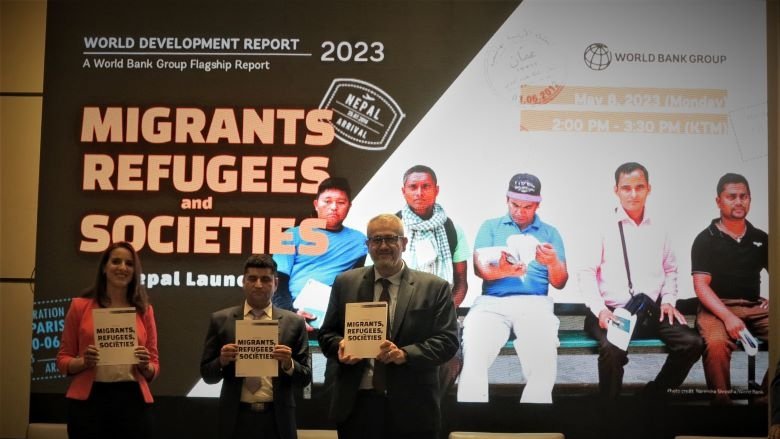KATHMANDU, May 8, 2023—Migration can serve as a force for growth and shared prosperity in all countries, according to a new report from the World Bank.
Launched in Nepal today, the World Development Report 2023: Migrants, Refugees, and Societies presents a powerful framework to guide policy making based on how well migrants’ skills and related attributes match the needs of destination countries and on the motive for their movement.
Populations across the globe are aging at an unprecedented pace, making many countries increasingly reliant on migration to realize their long-term growth potential. The report identifies this trend as a unique opportunity to make migration work better for economies and people. Wealthy countries as well as a growing number of middle-income countries—traditionally among the main sources of migrants—face diminishing populations, intensifying the global competition for workers and talent. Meanwhile, most low-income countries are expected to see rapid population growth, putting them under pressure to create more jobs for young people.
“Moving forward, empowering and equipping youth with the skills that will be needed in the global labor market will be crucial for both origin and destination countries to maximize the benefits of migration,” said Joyce Antone Ibrahim, Task Team Leader for the World Development Report, World Bank.
Beyond this demographic shift, the forces driving migration are also changing, making cross-border movements more diverse and complex. Today, destination and origin countries span all income levels, with many countries such as Mexico, Nigeria, and the U.K. both sending and receiving migrants. The number of refugees nearly tripled over the past decade. Climate change threatens to fuel more migration. So far, most climate-driven movements were within countries, but about 40% of the world’s population—3.5 billion people—lives in places highly exposed to climate impacts.
The report underscores the urgency of managing migration better. Origin countries should make labor migration an explicit part of their development strategy. They should lower remittance costs, facilitate knowledge transfers from their diaspora, build skills that are in high demand globally so that citizens can get better jobs if they migrate, mitigate the adverse effects of “brain drain,” protect their nationals while abroad, and support them upon return.
Destination countries should encourage migration where the skills migrants bring are in high demand, facilitate their inclusion, and address social impacts that raise concerns among their citizens. They should let refugees move, get jobs, and access national services wherever they are available.
“In Nepal, like many other low- and middle-income countries, remittances received from migration are a lifeline for many families and help reduce poverty,” said Faris Hadad-Zervos, World Bank Country Director for Maldives, Nepal, and Sri Lanka. “The World Bank is committed to finding effective ways to engage with the government on how to make the best of migration for Nepal’s development.”
International cooperation is essential to make migration a strong force for development. Bilateral cooperation can strengthen the match of migrants’ skills with the needs of destination countries. Multilateral efforts are needed to share the costs of refugee-hosting and to address distressed migration. Voices that are underrepresented in the migration debate must be heard: this includes developing countries, the private sector and other stakeholders, and migrants and refugees themselves.
The launch event included a conversation on actions for managing migration better with panelists Joyce Antone Ibrahim; Sonia Awale, Executive Editor of Nepali Times; and Prajwal Sharma, Head of Labor Mobility and Human Development at the International Organization for Migration (IOM) Nepal.

